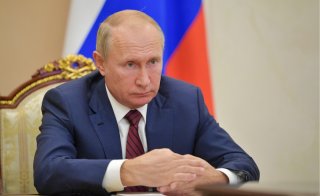Pro-Russian Media Narrative Takes Hold in Egypt
As the Arab world, indeed much of the Global South, “hedges its bets” and diversifies its foreign policy options, concerned policymakers in the West would be wise to pay attention to a war of words and narratives they are sorely losing.
On December 6 of last year, Russian president Vladimir Putin made a lightning tour to the Middle East to the UAE and Saudi Arabia amid heightened tensions and fears of a conflict spillover due to the situation in Gaza, which erupted following Hamas’s attack on October 7.
Although short, Putin’s visit received widespread attention and engagement on both social media and traditional mass media, particularly in the Arab world. Aided by an increasingly spreading narrative that Gulf countries are no longer subordinates to the West, the countries of the broader MENA region are encouraging each other to seek partnerships with other global powers, such as China and Russia.
Social and traditional media lit up with videos of the now famous “brotherly” handshakes between Putin and the de facto Saudi Arabia leader, Mohammed bin Salman (MBS). Furthermore, President Putin’s gracious welcoming ceremony in the UAE at the hand of Mohammed bin Zayed (MBZ) sent a message to the West that Putin still enjoys strong relations with what were once considered two of America’s closest allies.
All of this did not come out of the blue. Russia has been buttering up leaders in the Gulf and the wider region, benefiting from its careful self-positioning as an alternative partner, which can provide the oil-rich countries with non-Western options and potential leverage to advance their interests.
And this geopolitical hedging has not skipped the Arab world’s most populous country, Egypt. For some time, Russia and Egypt have enjoyed relatively positive relations, whether militarily, economically, politically, or, more recently, in the realm of the media.
In June 2023, Russian foreign minister Sergei Lavrov visited Egypt to meet with President Sisi. Prior to the visit, media reports noted that the Egyptian General Intelligence Service, which owns most of the mass media channels in the country, issued a decree instructing media outlets to promote Russia’s narrative regarding the conflict in Ukraine and to refer to news published on RT Arabic and Sputnik Arabic as main sources of information and media reports.
While this could be considered a gesture of courtesy with Russia’s top diplomat in town, the media cooperation and coordination of narratives between the two countries have proven to be enduring.
A cursory look at Egyptian coverage of Putin’s visit to the Gulf makes it patently clear that the Egyptian media is spreading the Russian narrative widely. Indeed, one of the main messages that Russian media promoted was that despite Western-imposed sanctions and an International Criminal Court arrest warrant, Putin successfully managed to break the Western siege, thwarting its agenda to turn the Russian regime into a pariah.
Egyptian media didn’t disappoint, with dozens of headlines echoing those same sentiments. One headline from Al Masry Al Youm read, “A ‘rare’ visit brings Putin out of ‘international isolation’ to receive a ‘warm’ reception in the Gulf,” while another from the Elbalad news website read, “He ignored the arrest warrant, and went to the Middle East…”
With RT and Sputnik Arabic services gaining massive traction in Egypt, their websites, social media, and TV channels have successfully managed to push the Russian official narrative into all levels of Egyptian society.
Egypt’s news agencies also appear to be singing from the Russian song sheet. In fact, Al-Ahram, the country’s leading news provider, has penned an official agreement with a Russian state news agency.
In a country that already faces restricted media freedom, dominant narratives are no coincidence in Egypt. However, the almost ubiquitous nature of anti-Western messaging, a message of decline and decadence contrasted with the image of a supposedly benevolent and actively involved Russia, receives very little pushback.
As the Arab world, indeed much of the Global South, “hedges its bets” and diversifies its foreign policy options, concerned policymakers in the West would be wise to pay attention to a war of words and narratives they are sorely losing.
Gokhan Cinkara is a researcher, a columnist, and an analyst. He is an assistant professor at Necmettin Erbakan University, and previously, he was a researcher at Ankara University on comparative politics, political parties, constitutional institutes, political sociology, intellectual history, and Israeli studies. He was a visiting researcher at Brandeis University in 2018 and a visiting researcher at the Hebrew University of Jerusalem from 2016-17. Cinkara received his PhD in political science from Ankara University. Follow him on X @gcinkara.
Image: Shutterstock.com.

